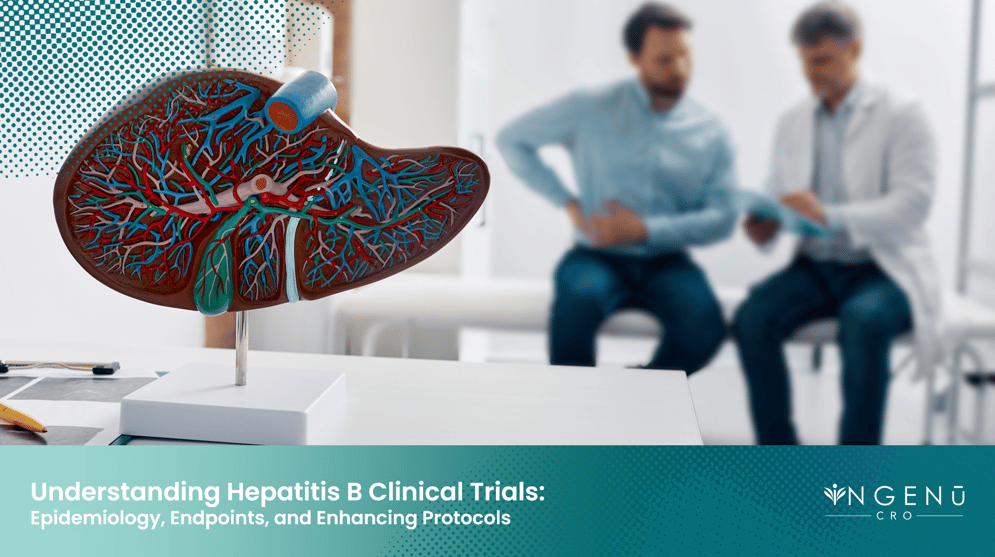Gastroenterology & Hepatology
Gastroenterology and hepatology trials tackle complex challenges across varied disease types. A patient-centric approach, combined with advancements in research and diagnostics, promises more effective therapies in the future.
We offer extensive experience across a range of gastroenterology and hepatology conditions, including:
- Inflammatory Bowel Disease (IBD)
Crohn's Disease
Ulcerative Colitis - Gastro-oesophageal Reflux Disease Reflux Disease (GORD)
- Irritable Bowel Syndrome (IBS)
- Gastrointestinal Cancers
Gastric, Colorectal, Pancreatic, Esophageal - Liver Diseases
NAFLD, Hepatitis, Cirrhosis
Disciplined,
Cost-Efficient Execution
while maintaining the Highest Quality
Local Trials,
Global Approvals
Access FDA Regulatory Expertise
Our Clinical Team has over
120
years
of Combined Clinical Trial Experience
Addressing Common Pain Points Associated with Gastroenterology & Hepatology Clinical Trials
Fluctuating Symptoms
Many gastrointestinal and liver conditions have fluctuating symptoms that are subjective and difficult to quantify, making it challenging to assess treatment efficacy based on clinical outcomes alone. Additionally, the invasive nature of some diagnostic procedures can deter patient participation in clinical trials.
iNGENū CRO addresses this pain point with Patient-Centric Approaches
Emphasising patient-reported outcomes offers insights into the real-world impact of interventions on patients' lives. It is crucial to consider the personal experiences of patients, given the intimate nature of many GI symptoms.
Disease Complexity
The complexity of diseases like IBD, NASH, and liver fibrosis requires precise biomarkers for early diagnosis, disease progression monitoring, and therapeutic response evaluation. However, biomarker discovery and validation remain a significant challenge in gastroenterology and hepatology trials.
iNGENū addresses this pain point with Biomarkers
These provide objective measures in conditions like IBD and liver diseases. The push for development and validation of biomarkers can streamline both diagnosis and treatment.
Diagnostic Methods
Traditional diagnostic methods such as biopsies and endoscopic procedures can be invasive, costly, and associated with patient discomfort. Moreover, standard imaging techniques may lack the sensitivity required for detecting early-stage disease changes.
iNGENū addresses this pain point with Advanced Imaging Techniques
Non-invasive techniques like endoscopic ultrasound or MRI enterography assess disease severity and therapeutic response without significant discomfort to the patient.
Protocol Development
Gastrointestinal and liver disorders encompass a broad spectrum of diseases with different aetiologies and progression rates. A one-size-fits-all protocol may fail to address the specific nuances of these conditions, leading to suboptimal study designs.
iNGENū addresses this pain point with Tailored Protocol Development
We specialise in custom protocol development that acknowledges the diverse disease spectrum in gastroenterology and hepatology, ensuring each trial is specifically designed to target the intended condition and outcome.
Heterogeneous Patient Populations
Many GI and hepatology conditions have heterogeneous patient populations with varying disease severity, comorbidities, and treatment histories, making patient stratification crucial for obtaining meaningful results.
iNGENū addresses this pain point with Advanced Patient Stratification Techniques
By leveraging state-of-the-art analytics and patient databases, we can identify and recruit patients that fit specific trial criteria, reducing variability and ensuring a homogeneous trial cohort.
Ethical and Regulatory Navigation
Gastroenterology and hepatology trials often involve complex regulatory requirements, particularly when testing new biologics, advanced therapeutics, or combination therapies. Navigating ethical concerns related to invasive procedures also adds to the regulatory burden.
iNGENū addresses this pain point with Regulatory Expertise
With a dedicated team of regulatory experts, we assist in streamlining the regulatory process, ensuring that all clinical trials comply with ethical guidelines and the latest regulations.
Gastroenterology & Hepatology Clinical Trial Resources

Heptatits B
Bridging the Past and Future of Treatment Strategies. From pivotal endpoints to enhancing trial success.

Inflammatory Bowel Disease
Exploring treatment drugs approved and failer for IBD, and lessons learned.
The iNGENū CRO Difference

Local Trials, Global Approvals
We uniquely combine Australian expertise with direct FDA submission capabilities, offering a streamlined path for sponsors to achieve global approval. Our seamless integration allows trial data from Australia to be submitted directly to the FDA via our E-Gateway, eliminating the need for third-party intermediaries.

Disciplined, Cost-Efficient Execution
iNGENū CRO takes a highly strategic and disciplined approach to clinical research, ensuring that every dollar is directed toward generating meaningful outcomes. Our trials are designed with efficiency in mind, eliminating unnecessary costs while maintaining the highest scientific and regulatory standards.

Australian-Headquartered, Asia-Pacific Reach
We provide sponsors with comprehensive trial capabilities across the Asia-Pacific region, offering a seamless combination of cost-efficiency and high-quality clinical trials. We leverage the region's competitive pricing while maintaining rigorous Australian-based project management and clinical oversight.

"We have been using iNGENū for a Phase 1, first-in-human trial of our investigational drug. We have used iNGENū for: Medical writing, project management, clinical data management and full end-to-end, clinical trial execution and monitoring.
We have been very happy with all aspects of the management of the clinical trial and have been particularly impressed by the out-of-the-box creative solutions to speed up and reduce overheads for our company during this clinical trial."
Giles Moss
Chief Executive Officer
Ready to discuss your Gastroenterology or Hepatology Clinical Trial?